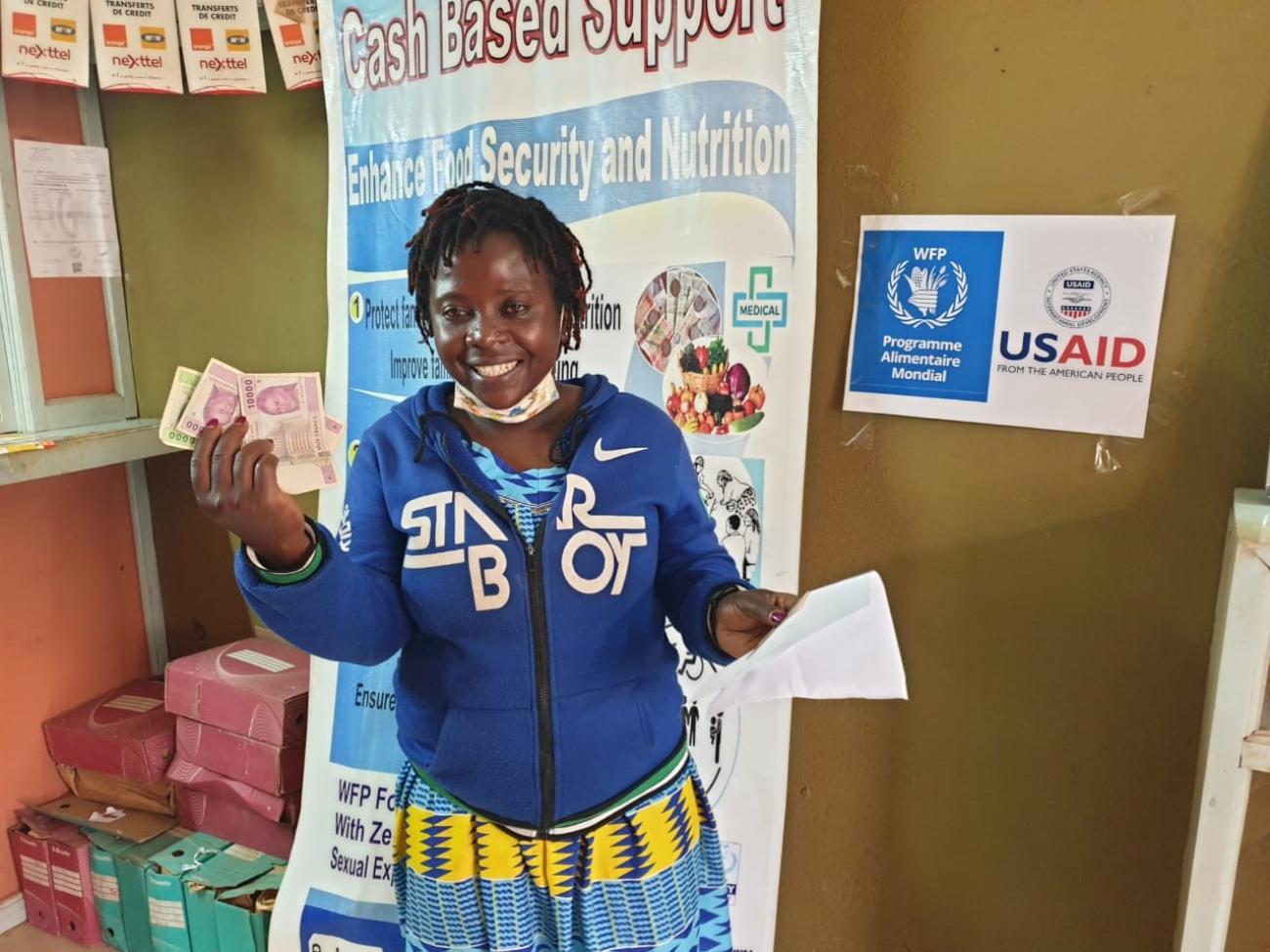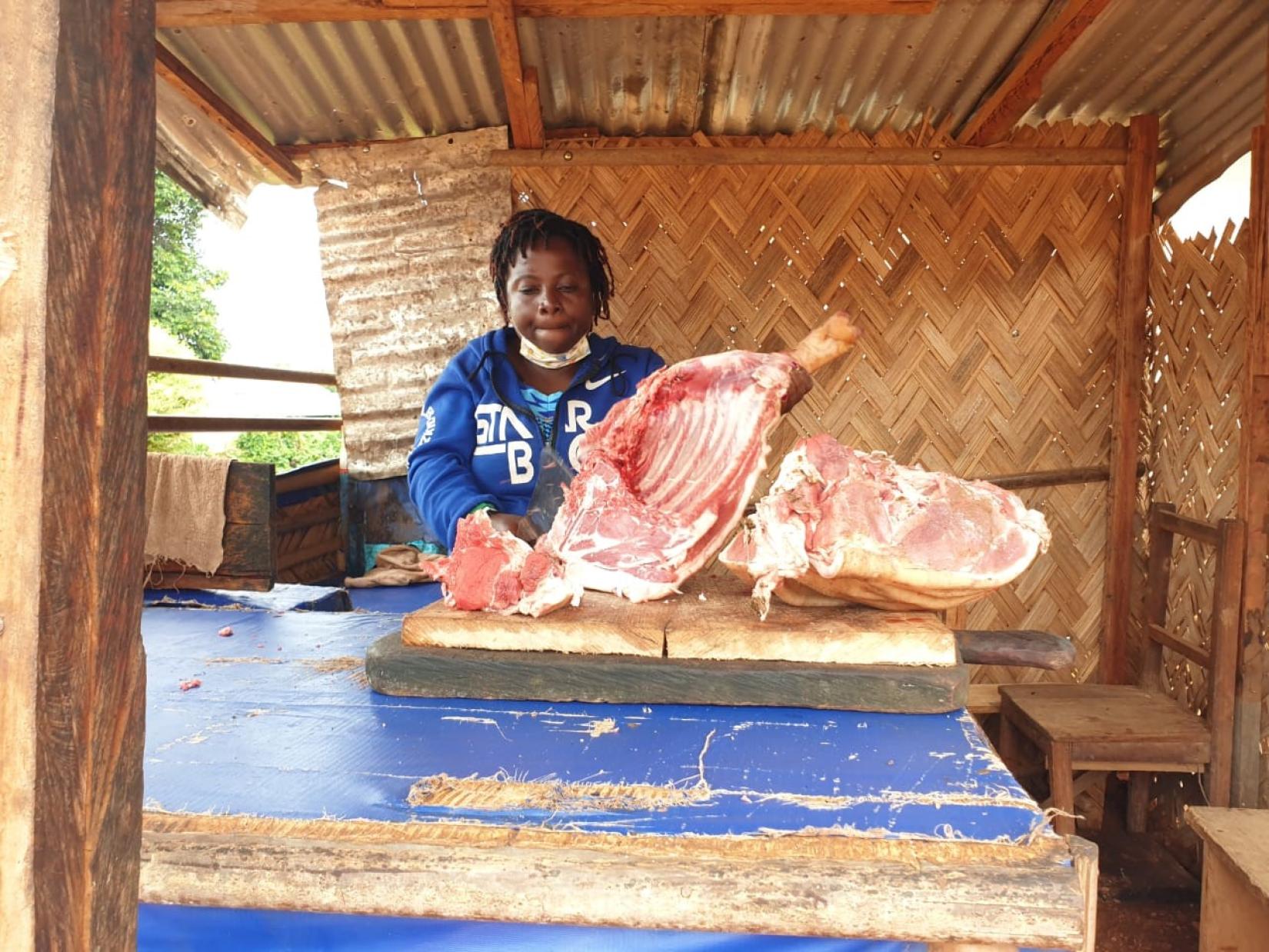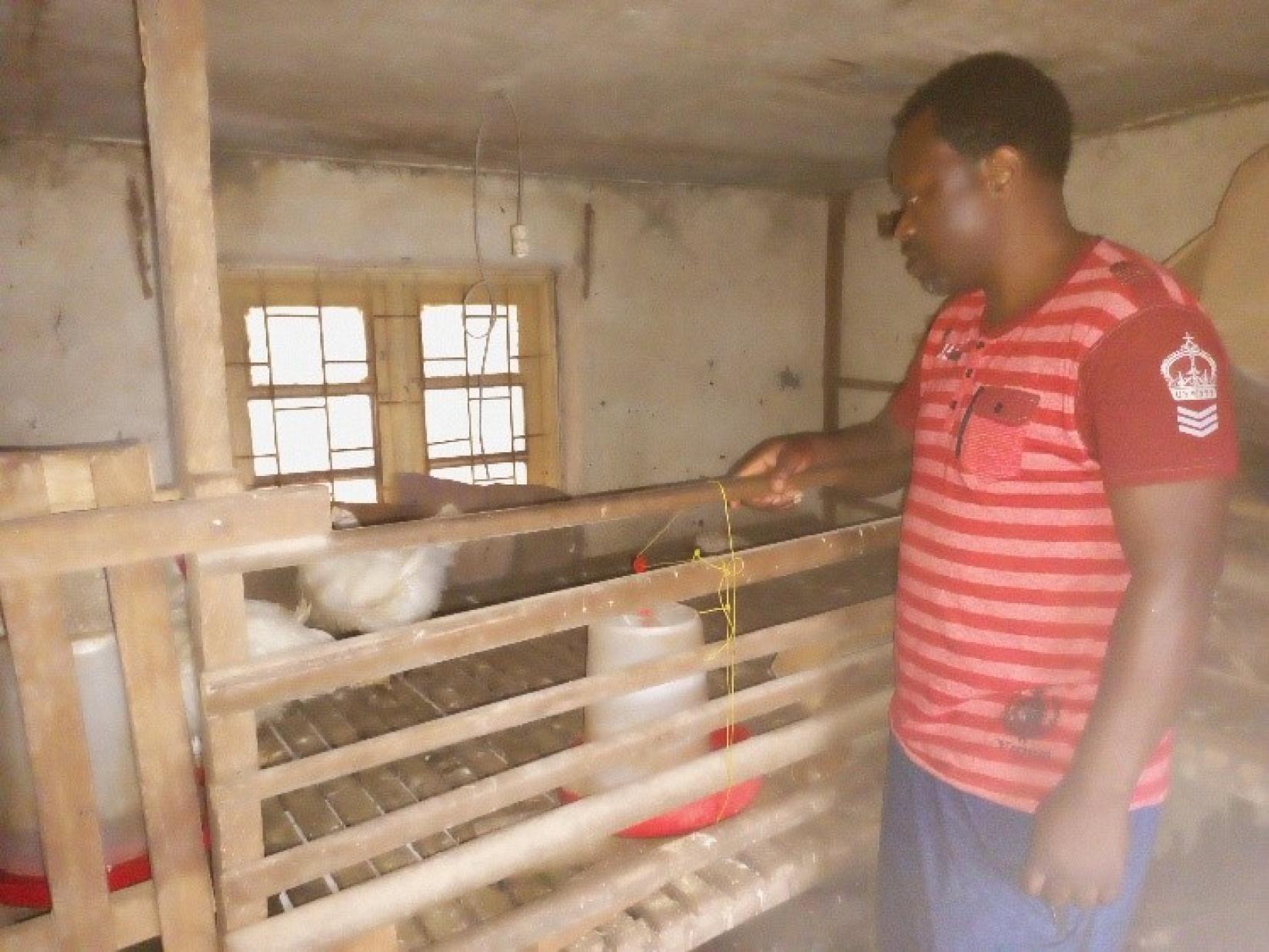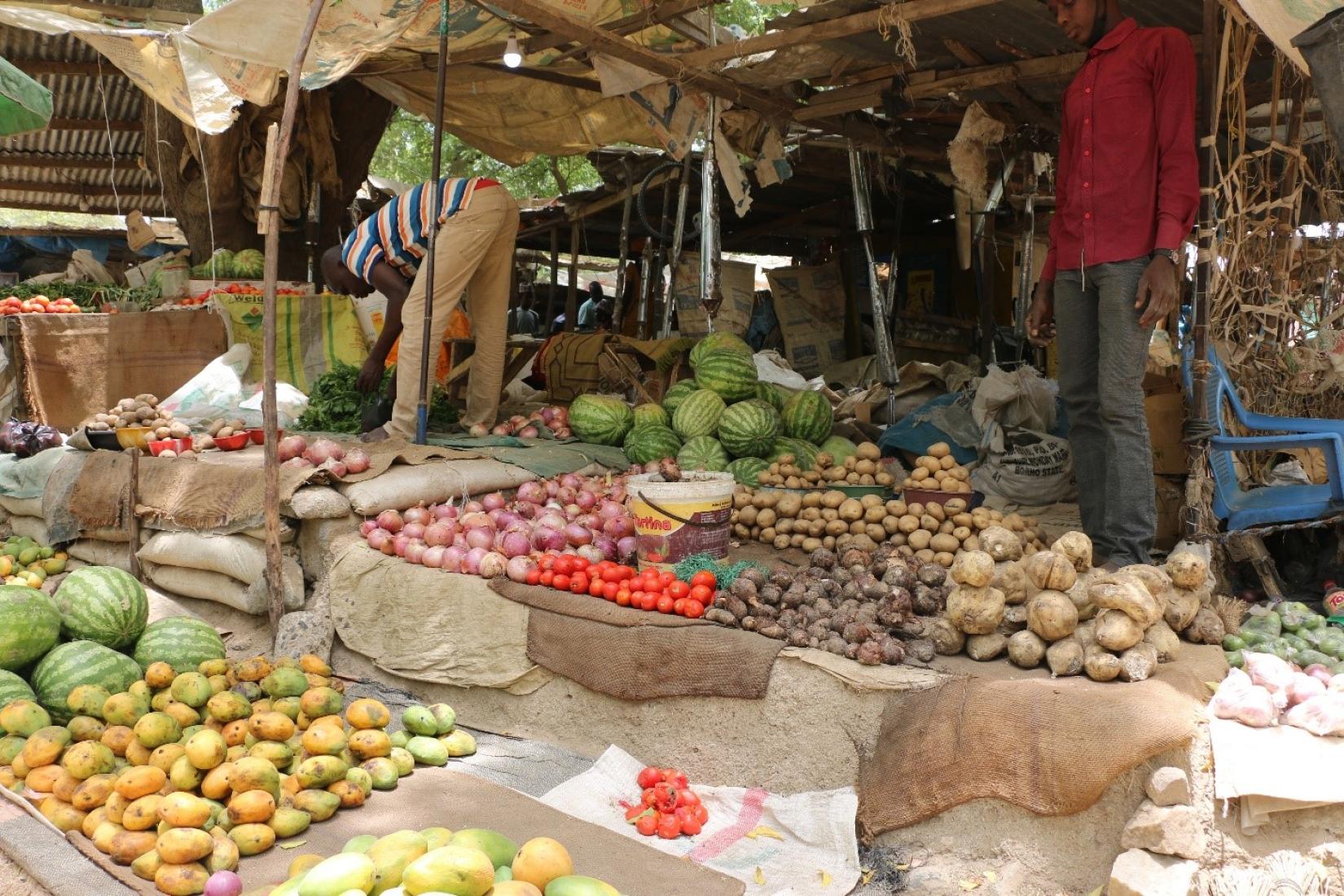Navigating the challenges of petty businesses in Cameroon’s restive Regions

How WFP cash assistance is helping men and women in Bamenda, North West region of Cameroon cope with the challenges of doing business in conflict zones.
Brendaline wakes up every day at about 5am in order to catch the butchers before the other “buyam sellams” (a local term for small retailers) come to crowd the stalls. She sells roasted pork by the roadside to help meet her family’s nutrition needs. Her small business that has been steadily growing, now hangs on a balance because frequent lockdowns in the North West and South West regions including Bamenda where she is, are increasing the uncertainty of doing business there.
Fighting broke out between government forces and non-state armed groups in 2016. Since then, regular ghost towns on Mondays and intermittent lockdowns have not only hampered humanitarian access but businesses as well.
Brendaline started her business in 2019 with WFP support. She had just fled violence in Bafut, her home village, 25KM from the main North West town of Bamenda. With no father in sight for her four children, she had to sustain an entire family of over eight people who had fled Bafut with her. When she just arrived Bamenda, feeding and shelter were a major challenge. There were days when they couldn’t even afford a meal and would have to spread relatives among other family members in town to find sleeping space.
Eventually she was enrolled into WFP’s food assistance programme and she began receiving cash to buy food to sustain the nutritional needs of her family. After receiving her monthly cash assistance, she would hurry to the local markets and buy what food she thought had the necessary nutritional value and was equally affordable for her family. If there were any leftovers, she would buy a few kilograms of pork from the butchers and sell in the evenings under a small stall close to where she lived.

“The butchers were always kind to me” Brendaline explained. “I would pay for a kilogram of pork, but they would also give me the offals and other internal parts not readily demanded in the market” she continued. “We would eat the offals and roast the regular kilogram to sell. For every kilogram that costs about 2,500 FCFA ($5), I’d probably make about 600 FCFA ($1) as profit,” Brendaline explained in broken English.
Over the span of nearly two years, she has steadily grown her business to the point where she is now able to buy a full pig. She has enrolled two of her kids into school and even on very bad days, “we are sure of at least one major meal to keep us going,” she says. “My hope is to one day grow the pigs myself, so I can increase my profit margins and not have to depend on anyone for support,” she said.
For Brendaline, the burden of succeeding in her business weighs heavily on her, especially when she remembers that there are eight people living with her who depend almost entirely on the assistance she receives and the profits she is able to make from the business. It is a feeling Theodore Chiatu is equally familiar with and a burden he has carried for a while.
Theodore used to be a teacher, but the crisis and lockdowns took a serious toll on schools and teachers. Some teachers were even targeted. Fearing for his life, and with no income from teaching, Theodore was forced to consider other possibilities to make ends meet. The situation became even dire for him when nine of his relatives fled the fighting in the village to join him in Bamenda.
“Things were tough while I was alone, but when the rest of my family joined me, it escalated to a whole new level,” he said. Within a month, he moved from being sure of his daily meals to living in perpetual worry of whether the nine people under his roof will even have one meal a day. Somedays, they were lucky and could manage a meal. Other days, they would just sit around waiting for help that may never come. Since even hoping for three meals a day seemed like such a luxury, they resorted to skipping meals.
The option to skip meals was a hard one to consider. There were children and elderly people living in Theodore’s house and under his care. Their eating habits and schedules are very particular. “As a man, I can easily skip meals, but how do you tell a nursing mother to skip a meal while her baby is screaming for breastmilk” Theodore asked.

He figured his best bet was to start a small business. So, he too began taking small portions of the cash assistance he received from WFP to buy birds for a poultry farm. Before long, he was making sales and the nutrition situation of his household began to improve. But Theodore’s poultry farm, just like Brendaline’s roadside business, are now threatened by frequent lockdowns like the 15-day lockdown called by non-state armed groups between September 16 and October 3, barely one week into the start of the 2021/2022 academic year.
All economic activity was halted. Transport services, provision shops and markets were all shutdown during that period. Even humanitarian organisations were forced to halt their field operations during this period. Theodore lost many of his young birds because he was unable to buy feed in time and Brendaline did not even bother opening her shop on lockdown days. “Many fowls have died. And because this business is very seasonal when you miss a market day (because of lockdown) costs could dramatically increase,” Theodore said
Many of the beneficiaries to WFP’s cash assistance programme have been able to engage in small businesses. “I am very grateful for the help WFP provides especially because I do not have to depend on anyone to meet my nutrition needs… but if these lockdowns persist, then we’ll continue to depend on WFP” Brendaline said. Her ultimate desire is for “the crisis to end, so we can reap the fruits of our labour.”

“This is obviously one of the up-sides to WFP’s cash transfer programme”, said Taban Lokonga, deputy emergency coordinator for the North West / South Crisis considered as a level 2 emergency. “It empowers families with the freedom to make their own food choices, giving more dignity, while building local markets. But for me, a major advantage in times like these, is that it allows beneficiaries the flexibility to plan in a volatile environment,” he said.
WFP’s food and cash assistance in the North West and South West regions is supported by the generous donations of Canada, European Union, Japan, Korea, the United Kingdom and the United States of America.






